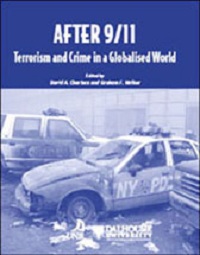After 9/11: Terrorism and Crime in a Globalised World
Edited by Dr. David Charters and Graham F. Walker
March 2005
Book flyer
Table of contents
Introduction
Conclusion
ISBN 978-1-896440-46-0
$25.00 CDN (plus S&H)
With the same alacrity as the felling of the Berlin Wall, the destruction of the attacks on September 11th marked the beginning of a new political era. In After 9/11: Terrorism and Crime in a Globalised World, over twenty policy-practitioners and academics from around the world engage in analysing the foremost issues and debates which confront us all in this troubling new global epoch of international terrorism and transnational organised crime. From determining how we should attempt to understand this new era and strive to shape it, to how we should go about behaving towards each other in it, Ater 9/11: Terrorism and Crime in a Globalised World critically examines those issues which impact all our lives, through our security to our mechanisms of government to our very social values.
After 9/11: Terrorism and Crime in a Globalised World represents an important collaboration between the University of New Brunswick’s Centre for Conflict Studies and Dalhousie University’s Centre for Foreign Policy Studies. Each Centre is currently engaged in research programmes to define and understand the dynamics of the new security environment, the contemporary manner in which threat actors behave in this environment, and in the process make relevant and employable policy recommendations to governments and their agencies as they strive to protect our security and values. This monograph brings the results of these two ambitious research agendas to the public, and addresses some of the most fundamental challenges and issues which policy makers and practitioners face today.
After 9/11: Terrorism and Crime in a Globalised World examines the challenges to democracies from threat actors, and the responses from democracies against threat actors through an evaluation of the consequences stemming from the 9/11 attacks. It does this so as to shed light on the dynamic interrelationship between the concepts of security and globalisation and the influences threat actors exert on this relationship. In doing so, the volume speaks to themes such as the new security environment, convergence theory and democratic principles in addition to highlighting the debates that surround each of them as it strives to answer fundamental and ‘policy relevant’ questions about the ‘events and problems’ of our contemporary world. The volume does this from the perspective of looking at what the potential consequences of our actions may be for the units of the international system and for that system itself in terms of the preservation of principles by which liberal democracies exist. By inference, the volume also represents a discussion concerning how our subjective perceptions of these threats shape our reactions to them through the vehicle of government policy. The volume represents important insights for both practitioners and the concerned public.
Please contact the centre to purchase a copy.
